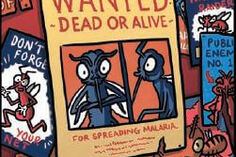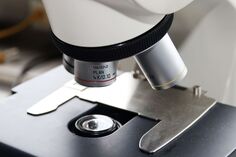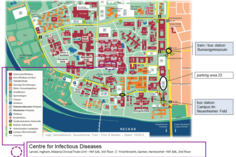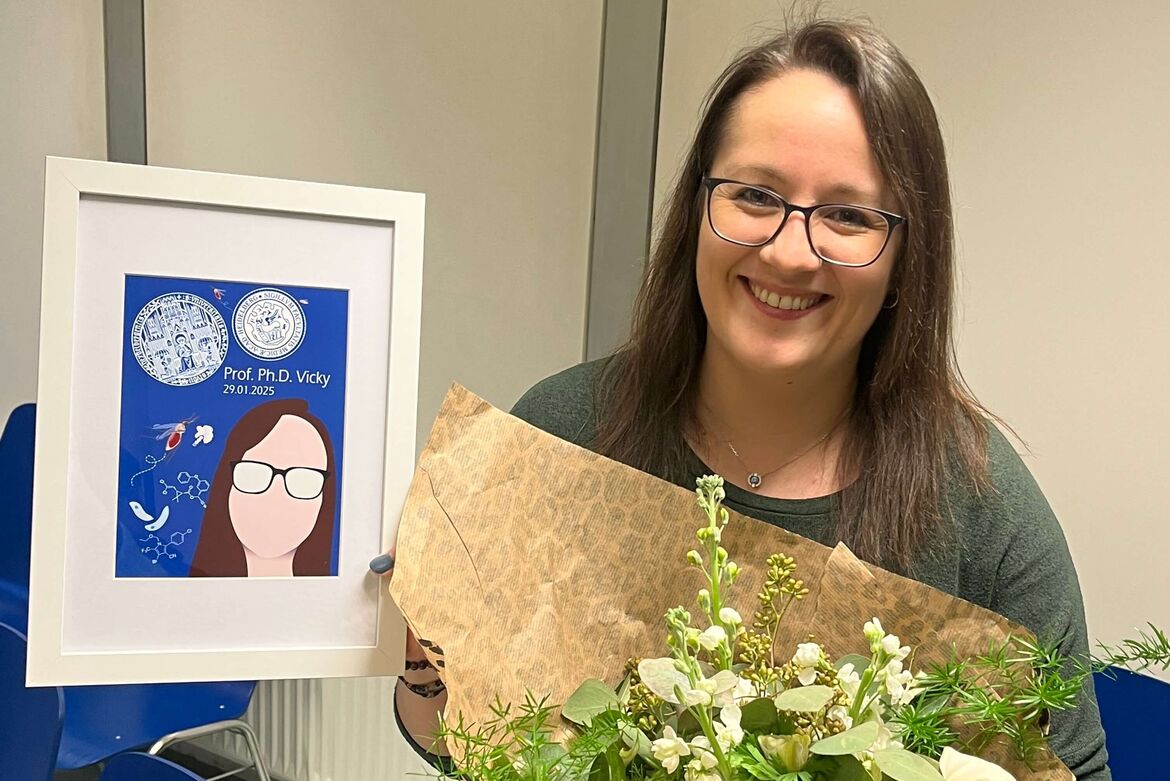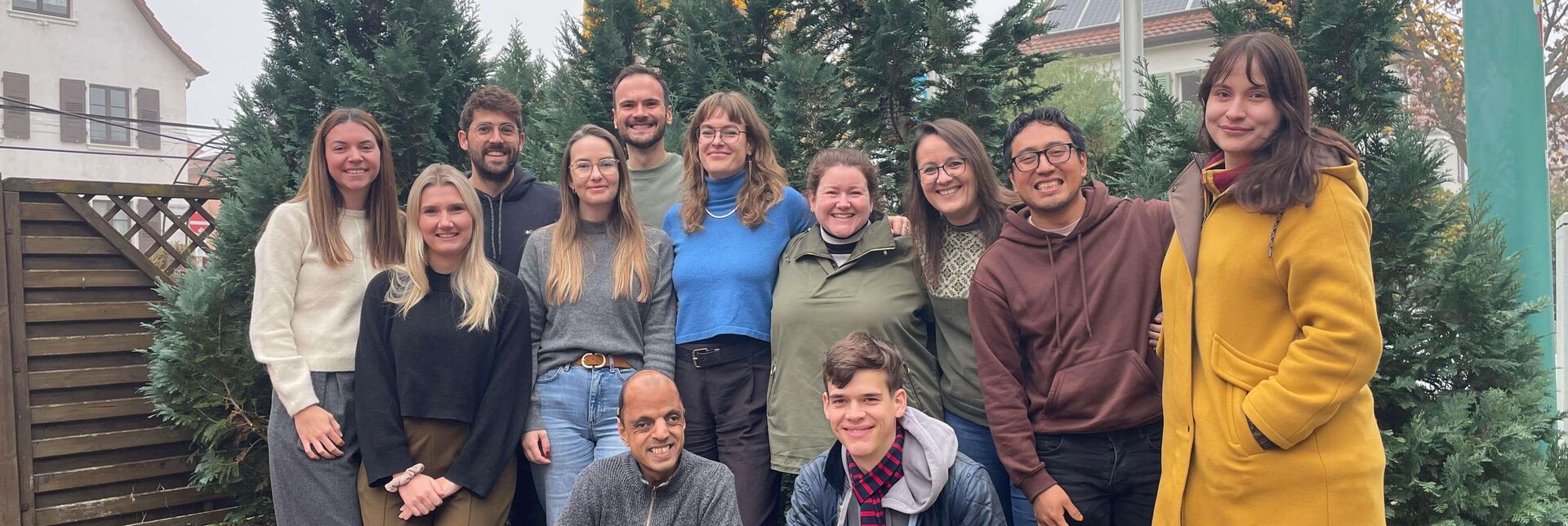
Lab members
Current members
Victoria Ingham, Ph.D. (Group leader, 2020 - present)
Dr. Juliane Hartke (Postdoc, 2023 - present)
Wasim Hussain, Ph.D. (Postdoc, 2023 - present)
Zahra Rezaei, Ph.D. (Postdoc, 2023 - present)
Antonia Böhmert (PhD student, 2022 - present)
Patrick Hörner (PhD student, 2021 - present)
Rhiannon Logan (PhD student, 2021 - present)
Carlos Lol (PhD student, 2022 - present)
Natalie Portwood (PhD student, 2023 - present)
Christoph Wenz (PhD student, 2023 - present)
Julia Mäurer (Technician)
& various BSc and MSc students :-)
Research Interests
Insecticide resistance (IR) is now widespread across many parts of the world which are reliant on public health insecticides to curb vector borne diseases. For example, over 80% of the reductions in malaria incidence between 2000 and 2015 were attributed to insecticide-based interventions, such as insecticide treated bed nets and indoor residual spraying. The use of insecticides leads to intensive selection pressure on the mosquito vectors, leading to high levels of IR.
IR in the major malaria vector species complex (Anopheles gambiae) is caused by five characterised resistance mechanisms (Figure 1) but is likely much more complex. For example, sub-lethal insecticide exposure, which occurs in areas with high levels of resistance, results in huge changes to the underlying transcriptome of Anopheles mosquitoes. Further, numerous lines of evidence indicate that this sub-lethal exposure results in large changes in underlying biology, such as changes in microbiome or redox state.
My research group investigates the impact of the insecticide resistance phenotype on Plasmodium development in vivo. Changes to mosquito biology and potential exposure to insecticidal compounds are likely to have huge impacts on the development of the malaria parasite within the mosquito vector (Figure 2). To address this, we combine bioinformatics and molecular biology to identify the pathways and genes important in these processes and characterise their effects on the two major phenotypes: vector competence and IR status.

Selected publications of the Ingham lab
=> Articles
Worku N, Sanou A, Hartke J, Morris M, Cissé F, Ouédraogo S, Tapsoba M, Vallon N, Akilu TD, Worku L, Guelbeogo MW, Ingham VA (2025) Insecticide resistant Anopheles from Ethiopia but not Burkina Faso show a microbiota composition shift upon insecticide exposure. Parasit Vectors. 2025 Jan 20;18(1):17. doi: 10.1186/s13071-024-06638-2. PMID: 39833936; PMCID: PMC11748507.
Gandara L, Jacoby R, Laurent F, Spatuzzi M, Vlachopoulos N, Borst NO, Ekmen G, Potel CM, Garrido-Rodriguez M, Böhmert AL, Misunou N, Bartmanski BJ, Li XC, Kutra D, Hériché JK, Tischer C, Zimmermann-Kogadeeva M, Ingham VA, Savitski MM, Masson JB, Zimmermann M, Crocker J (2024) Pervasive sublethal effects of agrochemicals on insects at environmentally relevant concentrations. Science. Oct 25;386(6720):446-453. doi: 10.1126/science.ado0251. Epub 2024 Oct 24. (PMID: 39446951) / see also the newspaper article on FAZnet
Logan RAE, Mäurer JB, Wapler C, Ingham VA (2024) Uridine diphosphate (UDP)-glycosyltransferases (UGTs) are associated with insecticide resistance in the major malaria vectors Anopheles gambiae s.l. and Anopheles funestus. Sci Rep. Aug 27;14(1):19821. doi: 10.1038/s41598-024-70713-y. (PMID: 39191827; PMCID: PMC11350197)
Oke CE, Ingham VA, Walling CA, Reece SE (2022) Vector control: agents of selection on malaria parasites? Trends Parasitol. Oct;38(10):890-903. doi: 10.1016/j.pt.2022.07.006. Epub 2022 Aug 16. (PMID: 35981937)
Williams J, Ingham VA, Morris M, Toé KH, Hien AS, Morgan JC, Dabiré RK, Guelbéogo WM, Sagnon N, Ranson H (2022) Sympatric Populations of the Anopheles gambiae Complex in Southwest Burkina Faso Evolve Multiple Diverse Resistance Mechanisms in Response to Intense Selection Pressure with Pyrethroids. Insects. Feb 28;13(3):247. doi: 10.3390/insects13030247. (PMID: 35323544; PMCID: PMC8955173)
Ingham VA, Tennessen JA, Lucas ER, Elg S, Yates HC, Carson J, Guelbeogo WM, Sagnon N, Hughes GL, Heinz E, Neafsey DE, Ranson H (2021) Integration of whole genome sequencing and transcriptomics reveals a complex picture of the reestablishment of insecticide resistance in the major malaria vector Anopheles coluzzii. PLoS Genet. Dec 23;17(12):e1009970. doi: 10.1371/journal.pgen.1009970. (PMID: 34941884; PMCID: PMC8741062)
Ingham VA, Elg S, Nagi SC, Dondelinger F (2021) Capturing the transcription factor interactome in response to sub-lethal insecticide exposure. Curr Res Insect Sci.1:None. doi: 10.1016/j.cris.2021.100018. (PMID: 34977825; PMCID: PMC8702396)
Ingham, V. A., Brown, F., & Ranson, H. (2021). Transcriptomic analysis reveals pronounced changes in gene expression due to sub-lethal pyrethroid exposure and ageing in insecticide resistance Anopheles coluzzii. BMC genomics, 22(1), 337. (PMID: 33971808)
Tennessen, J. A., Ingham, V. A., Toé, K. H., Guelbéogo, W. M., Sagnon, N., Kuzma, R., Ranson, H., & Neafsey, D. E. (2021). A population genomic unveiling of a new cryptic mosquito taxon within the malaria-transmitting Anopheles gambiae complex. Molecular ecology, 30(3), 775–790. (PMID: 33253481)
Lees, R. S., Ambrose, P., Williams, J., Morgan, J., Praulins, G., Ingham, V. A., Williams, C. T., Logan, R., Ismail, H. M., & Malone, D. (2020). Tenebenal: a meta-diamide with potential for use as a novel mode of action insecticide for public health. Malaria journal, 19(1), 398. (PMID: 33168015)
Brown F, Paton DG, Catteruccia F, Ranson H, Ingham VA. (2020) A steroid hormone agonist reduces female fitness in insecticide-resistant Anopheles populations. Insect Biochem Mol Biol. Jun;121:103372. doi: 10.1016/j.ibmb.2020.103372. Epub 2020 Apr 8. (PMID: 32276112)
Minetti C, Ingham VA, Ranson H. (2020) Effects of insecticide resistance and exposure on Plasmodium development in Anopheles mosquitoes. Curr Opin Insect Sci. Jun;39:42-49. doi: 10.1016/j.cois.2019.12.001. Epub 2020 Jan 30. (PMID: 32109860) Review.
Ingham VA, Bennett A, Peng D, Wagstaff SC, Ranson H. (2020) IR-TEx: An Open Source Data Integration Tool for Big Data Transcriptomics Designed for the Malaria Vector Anopheles gambiae. J Vis Exp. Jan 15;(155). doi: 10.3791/60721. (PMID: 32009657)
Ingham VA, Anthousi A, Douris V, Harding NJ, Lycett G, Morris M, Vontas J, Ranson H. (2020) A sensory appendage protein protects malaria vectors from pyrethroids. Nature. Jan;577(7790):376-380. doi: 10.1038/s41586-019-1864-1. Epub 2019 Dec 25. (PMID: 31875852) Free PMC article.
Williams J, Flood L, Praulins G, Ingham VA, Morgan J, Lees RS, Ranson H. (2019) Characterisation of Anopheles strains used for laboratory screening of new vector control products. Parasit Vectors. Nov 5;12(1):522. doi: 10.1186/s13071-019-3774-3. (PMID: 31690332) Free PMC article.
Ingham VA, Wagstaff S, Ranson H. (2018) Transcriptomic meta-signatures identified in Anopheles gambiae populations reveal previously undetected insecticide resistance mechanisms. Nat Commun. 2018 Dec 11;9(1):5282. doi: 10.1038/s41467-018-07615-x. (PMID: 30538253) Free PMC article.
Pignatelli P, Ingham VA, Balabanidou V, Vontas J, Lycett G, Ranson H. (2018) The Anopheles gambiae ATP-binding cassette transporter family: phylogenetic analysis and tissue localization provide clues on function and role in insecticide resistance. Insect Mol Biol. 2018 Feb;27(1):110-122. doi: 10.1111/imb.12351. Epub 2017 Oct 25. (PMID: 29068552)
Ingham VA, Pignatelli P, Moore JD, Wagstaff S, Ranson H. (2017) The transcription factor Maf-S regulates metabolic resistance to insecticides in the malaria vector Anopheles gambiae. BMC Genomics. 2017 Aug 30;18(1):669. doi: 10.1186/s12864-017-4086-7. (PMID: 28854876) Free PMC article.
Ingham VA, Jones CM, Pignatelli P, Balabanidou V, Vontas J, Wagstaff SC, Moore JD, Ranson H. (2014) Dissecting the organ specificity of insecticide resistance candidate genes in Anopheles gambiae: known and novel candidate genes. BMC Genomics. 2014 Nov 25;15(1):1018. doi: 10.1186/1471-2164-15-1018.(PMID: 25421852) Free PMC article.
=> Reviews
Böhmert AL, Logan RAE, Portwood NM, Hartke J, Ingham VI (2024) A descriptive review of next-generation insecticide-treated bed nets for malaria control. Frontiers in Malaria. REVIEW doi:10.3389/fmala.2024.1337572. ISSN=2813-7396
Ingham, VI, Grigoraki L, Ranson H (2023) Pyrethroid resistance mechanisms in the major malaria vector species complex. Entomologia Generalis. Vol. 43 Number 3, p. 515 - 526. DOI: 10.1127/entomologia/2023/1880
=> Preprints
Netsanet Worku, Antoine Sanou, Juiane Hartke et al. Insecticide resistant Anopheles from Ethiopia but not Burkina Faso show a microbiome composition shift upon insecticide exposure., 23 October 2024, PREPRINT (Version 1) available at Research Square [https://doi.org/10.21203/rs.3.rs-5150012/v1]
Victoria Ingham, Sanjay Nagi. Genomic Profiling of Insecticide Resistance in Malaria Vectors: Insights into Molecular Mechanisms., 14 February 2024, PREPRINT (Version 1) available at Research Square [https://doi.org/10.21203/rs.3.rs-3910702/v1]
News - Ingham group
How to get in touch:

Prof. Victoria Ingham, Ph.D.;
W1-Professor for Translational Parasitology
Centre for Infectious Diseases, Parasitology
Heidelberg University Hospital
Im Neuenheimer Feld 324 (3rd floor, r. 305 and lab 320)
69120 Heidelberg, Germany
Tel. +49 (0)6221 56-35236 (office) / -8284 (lab) / -7438 (PhD office)

